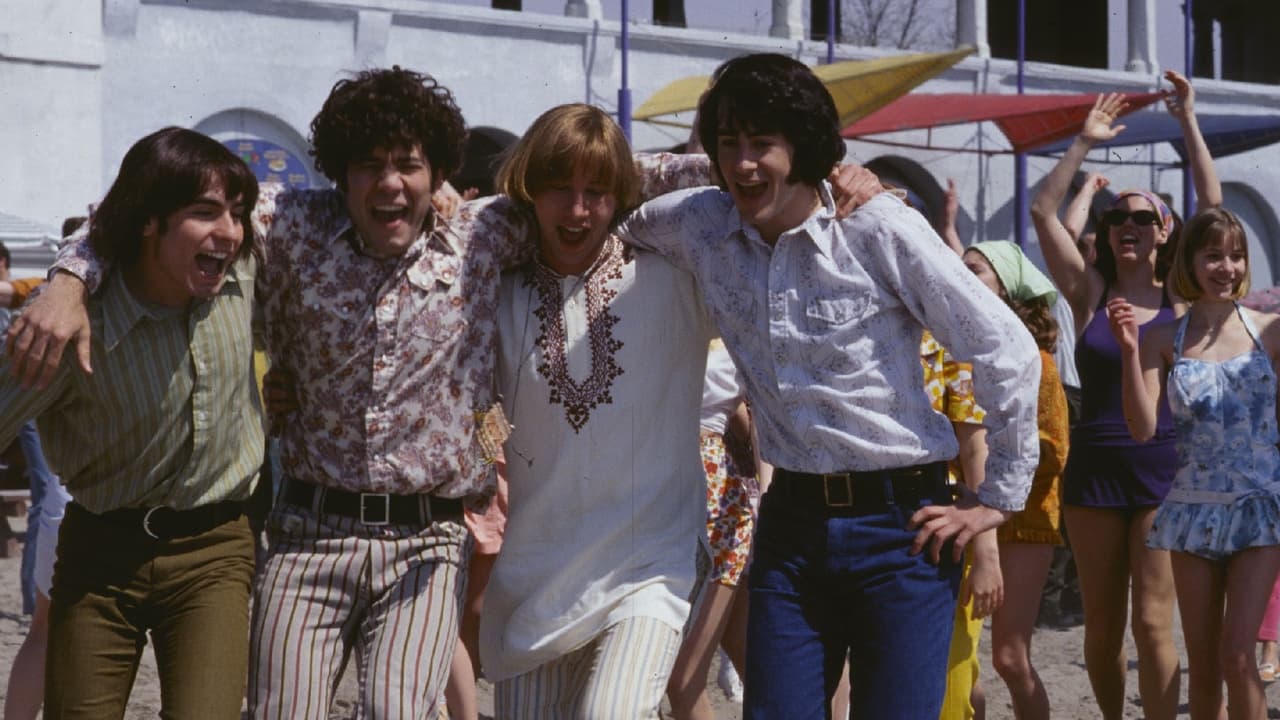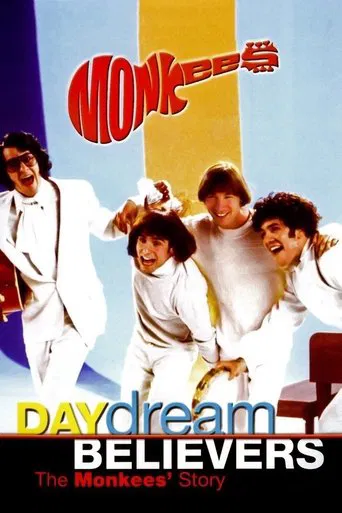

Being a true Monkees buff, I'd have to say that, after one gets over the inaccuracies in the script, the filmmakers couldn't have done a better job. Unmentioned in previous reviews is the all-consuming egomania displayed by Colgems music president Don Kirshner, who made so much money during his 9-10 months in charge that his casual dismissal of the four individual Monkees is nothing less than petty (to the end of his life, he always insisted on total credit for their success). The script manages to incorporate just about all the most famous names associated with the group: songwriters (Neil Sedaka, Neil Diamond, Carole King, Tommy Boyce and Bobby Hart), and performers (The Beatles, Jimi Hendrix, Jack Nicholson). The four actors were all praiseworthy, particularly L. B. Fisher's Tork, who conveys that inner essence the show rarely allowed. The three others basically played extensions of themselves, but Peter had to play a kind of 'Harpo Marx/Stan Laurel' composite, not so much 'the dummy,' as he himself described it, but simply the trusting, naïve innocent, which of course he definitely was not. George Stanchev really nails Davy's moves, and probably bears the strongest physical resemblance to his namesake (amazingly, neither of these two actors worked beyond 2003). Jeff Geddis gets the full portrait of Nesmith, who wasn't as volatile as this suggests, nor apologetic, simply an ambitious young man who saw the TV series as a means to an end. Of course, he had the most experience in the studio (both as a writer and producer), and did encourage the others to compose their own songs. Aaron Lohr's Micky isn't as good as the others, but to be fair it appears he had less to work with, scriptwise; Micky Dolenz was such an enormous talent in front and behind the camera, that to this day his remains one of the most recognized voices of the 1960s. Rather than carp on what's missing, consider how the existence of this modest little biopic shot in Canada is not just a boon for The Monkees themselves, but a nice introduction for younger viewers unfamiliar with the phenomenon (forget 1987's The New Monkees). Actual Monkees recordings used: "(Theme from) The Monkees," "Last Train to Clarksville," "I'm a Believer," "Daydream Believer," "I Wanna Be Free," and "(I'm Not Your) Steppin' Stone," the latter two actual live performances from the band's 1967 summer tour (heck, the only essential one missing really is "Pleasant Valley Sunday"). "All of Your Toys" was a Bill Martin composition that earned the distinction of being their very first studio recording as a band (Jan 16 1967), but due to it not being a Screen Gems copyright remained in the can until 1987's MISSING LINKS release. As an added bonus, used during their meeting with The Beatles, is "(All in the) All in All," from the 1998 disc RE-ZOOM by The Knack, a group that was ballyhooed in 1979 ("My Sharona," "Good Girls Don't") as being 'Beatlesque,' and once you hear it you'll understand why.
... View MoreI've been reading a lot of the other reviews of the this movie and on this site, and almost of the all of bad reviews point about the film's minor historical inaccuracies. I have been a huge Monkees fan for a long time and I can personally assure you that this movie is 100% percent historically accurate. Everything down to the last plot detail is true, except for the end. in this movie, After the show got cancelled and the movie Head flops, the Monkees are still together. This isn't true because after all of those things happened, the Monkees broke up. but other than that,it's entirely historically accurate.What makes this film even better is the fact that not only do are four Lead actors dead ringers to the real Monkees, but they also act like the real Monkees. If you read the plot of this movie and you look up the story of the Monkees, you'll find there both the same. I'd highly recommend this movie to any casual fan of the Monkees who doesn't know anything about there story. It's definitely worth the watch.
... View MoreDaydream Believer is enjoyable to watch for the novice Monkees listener/watcher, but for those knowledgeable in Monkey history, there are too many inaccuracies to be ignored. Although the actors playing the four Monkees are excellent choices, their evolution from nobodies to rock stars does not exist: from small visual differences (the Mickey character starts with an afro instead getting it a year after the show started like in real life), to recording (the first song they attempted was not "All Of Your Toys") to an abrupt ending that tells only a fraction of the Monkees story. The movie is almost played up too light-hearted, too tongue-in-cheek. The Monkees history is an interesting one; filmmakers should have considered ending it's story after Nesmith's departure in 1969/1970 - although it may have made for a three-hour movie. The movie does not touch on Peter's leaving, nor the band's individual recording sessions, nor their form into a trio and subsequent concerts with Ike and Tina Turner - all details important to Monkees history. Although there are nice touches to the film (like a partial recreation of the show's opening credits and an episode of "A Monkees Fairy Tale"), a life-long fan and Monkeephile will pick this movie apart like er, two monkeys grooming themselves.
... View MoreDAYDREAM BELIEVERS: THE MONKEES' STORY Aspect ratio: 1.33:1Sound format: StereoThe rise and fall of a manufactured pop group - America's answer to The Beatles - who struggled to be taken seriously as bona fide musicians.Appropriately for a band as airbrushed and stage-managed as The Monkees, Neill Fearnley's entertaining biopic is equally airbrushed and stage-managed, dispensing with unpleasant reality (for the most part) in favor of feel-good party tricks. Ron McGee's innocuous teleplay (based on Harold Bronson's book 'Hey Hey We're the Monkees') sketches the group's history in broad narrative strokes, from the audition which brought Davy (George Stanchev), Micky (Aaron Lohr), Peter (L.B.Fisher) and Mike (Jeff Geddis) together, to the international success of their madcap TV show (used as little more than a marketing tool) and their subsequent disillusionment, sparked by management's refusal to allow them greater creative input. Events are depicted in pastel shades, rather like the TV show, but without the laughs. Peter is shown smoking pot, and the guys' bickering descends into chaos as the band falls apart (they disbanded in 1970), but the script refuses to take risks, which means viewers are short-changed by a lack of historical accuracy: For example, there's no mention of the resentment caused when Peter Tork became the first to jump ship in 1969, only a bittersweet ending which barely mentions their break-up at all.Fans will be astonished by the physical resemblance of the actors to their real-life counterparts (except for Lohr, whose similarity to Micky Dolenz is superficial at best), and their impersonations are equally remarkable, especially during the lengthy musical interludes (including a meticulous recreation of the famous 'Daydream Believer' promo, and the opening montage of the TV show), all realized with startling accuracy. If nothing else, however, "Daydream Believers..." reminds us that The Monkees produced some of the most enduring pop songs of the 1960's (including 'Last Train to Clarksville', 'I'm a Believer' and the excellent 'All of Your Toys'), reproduced here in their entirety (the actors mime to original recordings). Devotees will either be outraged or enthralled.NB. 'Jack Nicholson' and 'John Lennon' turn up in brief cameos, both played by uncredited actors.
... View More